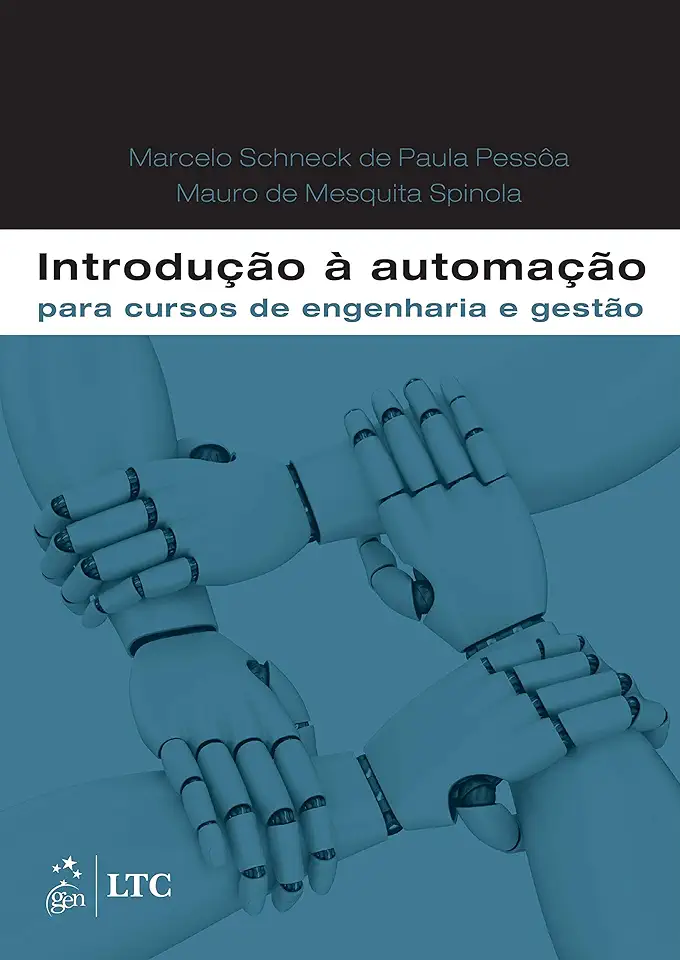
Introduction to Automation for Engineering and Management Courses - Marcelo Schneck de Paula Pessôa
Introduction to Automation for Engineering and Management Courses
A Comprehensive Guide to the Fundamentals of Automation
In today's rapidly evolving industrial landscape, automation has become an indispensable tool for businesses seeking to enhance efficiency, productivity, and competitiveness. This comprehensive introduction to automation provides a solid foundation for engineering and management students, equipping them with the knowledge and skills necessary to harness the power of automation in their respective fields.
Key Features:
Comprehensive Coverage: This book covers a wide range of automation topics, from basic concepts and technologies to advanced applications and emerging trends.
Real-World Examples: Numerous real-world examples and case studies illustrate the practical applications of automation in various industries, making the concepts relatable and applicable.
Hands-On Exercises: Each chapter includes hands-on exercises and assignments, allowing students to reinforce their understanding and apply the concepts learned.
Up-to-Date Content: The book incorporates the latest advancements in automation technology, ensuring that students are well-equipped with the most current knowledge.
Chapter Summaries:
Chapter 1: Introduction to Automation
- Provides an overview of automation, its history, and its significance in modern industries.
- Discusses the benefits and challenges of automation, as well as its impact on the workforce.
Chapter 2: Basic Concepts of Automation
- Introduces the fundamental concepts of automation, including control systems, feedback loops, and sensors.
- Explains the different types of automation, such as fixed automation, programmable automation, and flexible automation.
Chapter 3: Automation Technologies
- Explores various automation technologies, including programmable logic controllers (PLCs), distributed control systems (DCSs), and industrial robots.
- Discusses the advantages and disadvantages of each technology, as well as their applications in different industries.
Chapter 4: Sensors and Instrumentation
- Covers the different types of sensors used in automation, including proximity sensors, temperature sensors, and pressure sensors.
- Explains the principles of operation and the applications of each sensor type.
Chapter 5: Control Systems
- Introduces the fundamental concepts of control systems, including feedback control, proportional-integral-derivative (PID) control, and cascade control.
- Provides examples of control systems in various industrial applications.
Chapter 6: Industrial Robotics
- Explores the different types of industrial robots, including articulated robots, SCARA robots, and delta robots.
- Discusses the components of industrial robots, their programming, and their applications in manufacturing and other industries.
Chapter 7: Computer-Integrated Manufacturing (CIM)
- Introduces the concept of CIM and its components, such as computer-aided design (CAD), computer-aided manufacturing (CAM), and enterprise resource planning (ERP).
- Explains the benefits of CIM and its implementation challenges.
Chapter 8: Emerging Trends in Automation
- Discusses the latest trends in automation, including the Internet of Things (IoT), artificial intelligence (AI), and machine learning.
- Explores the potential impact of these technologies on the future of automation and industry.
Why You Should Read This Book:
- Gain a comprehensive understanding of automation, its technologies, and its applications.
- Develop the skills necessary to design, implement, and maintain automated systems.
- Stay up-to-date with the latest advancements in automation and prepare for the future of industry.
Order Your Copy Today!
Don't miss out on this opportunity to master the fundamentals of automation and unlock the potential for increased efficiency, productivity, and competitiveness in your chosen field. Order your copy of "Introduction to Automation for Engineering and Management Courses" today and embark on a journey towards automation mastery!
Enjoyed the summary? Discover all the details and take your reading to the next level — [click here to view the book on Amazon!]